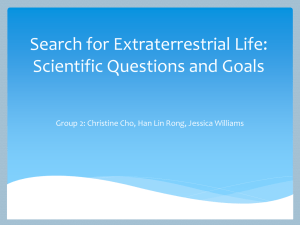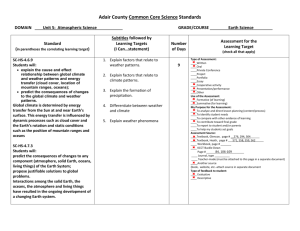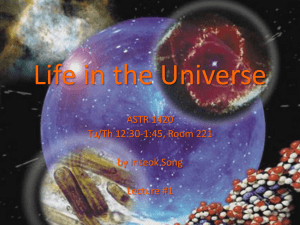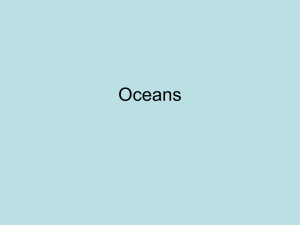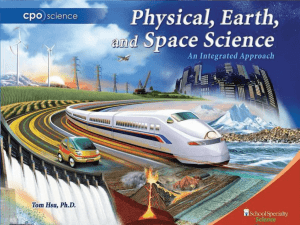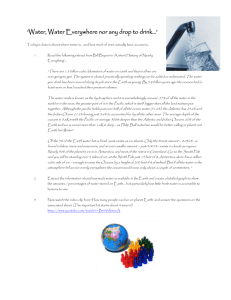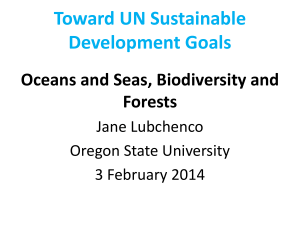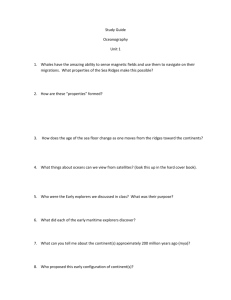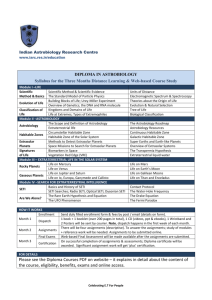MSL294-Astrobiology_..
advertisement
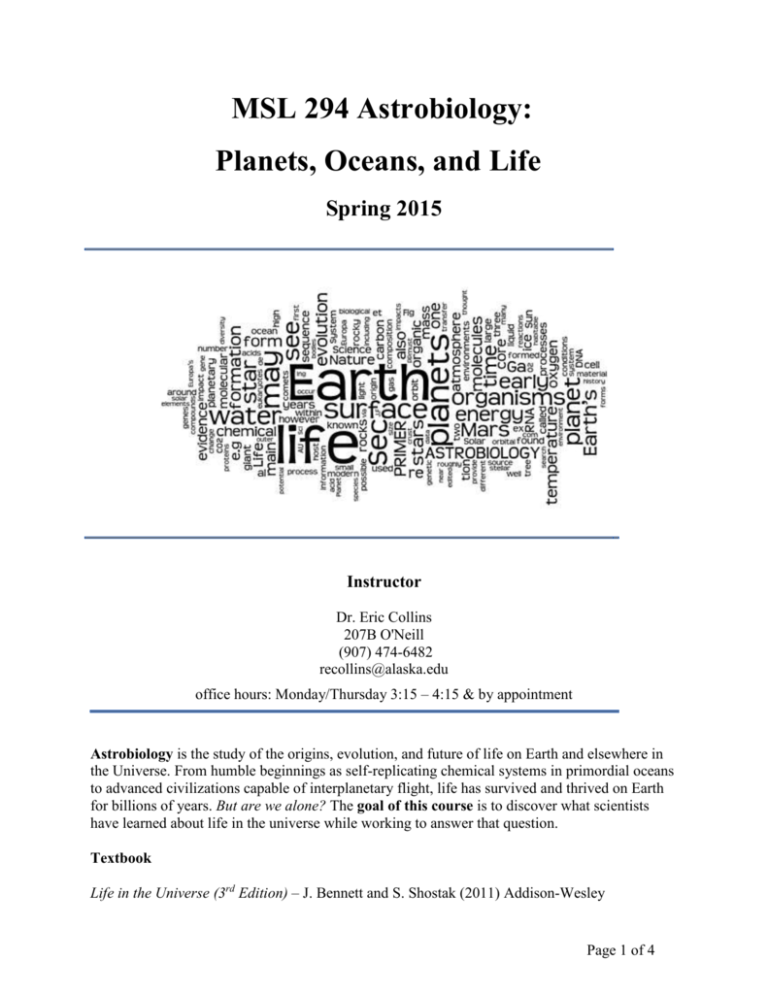
MSL 294 Astrobiology: Planets, Oceans, and Life Spring 2015 Instructor Dr. Eric Collins 207B O'Neill (907) 474-6482 recollins@alaska.edu office hours: Monday/Thursday 3:15 – 4:15 & by appointment Astrobiology is the study of the origins, evolution, and future of life on Earth and elsewhere in the Universe. From humble beginnings as self-replicating chemical systems in primordial oceans to advanced civilizations capable of interplanetary flight, life has survived and thrived on Earth for billions of years. But are we alone? The goal of this course is to discover what scientists have learned about life in the universe while working to answer that question. Textbook Life in the Universe (3rd Edition) – J. Bennett and S. Shostak (2011) Addison-Wesley Page 1 of 4 Suggested supplementary readings: The Astrobiology Primer: An Outline of General Knowledge – L.J. Mix and 21 others (2006) URL http://arxiv.org/abs/astro-ph/0610926 Astrobiology: A Multidisciplinary Approach – J. Lunine (2005) Addison-Wesley Course outline: MWF 1:00—2:00 (3 hours per week), Room 201 O’Neill First Day of Classes: Friday, 16 January, 2015 Mid-term Examination 1: Friday, 13 February, 2015 Mid-term Examination 2: Friday, 10 April, 2015 Last Day of Classes: Monday, 4 May, 2015 Final Examination: XXX, XXX--XXXpm, Room 201 O’Neill Course description: MSL 294, Astrobiology, 3+0 credits Prerequisites: ENGL 111X and one of the following: BIOL 103X, CHEM 103X, GEOS 101X, PHYS 102X. Study of life in the universe from a transdisciplinary perspective, bringing together insights from physics, astronomy, geology, chemistry, and biology. Topics include the evolution of the universe, planets, oceans and life. Past and present oceans found in the Solar System provide case studies from which to examine the potential for life on and off the Earth. Societal questions related to the origins of life, global climate change, and the possibility of extraterrestrial life will be discussed. Learning Outcomes: - Understand and explain the basic physical and chemical structure of the universe - Evidence knowledge of major planetary formation and evolutionary processes - Understand and discuss the relevance of water for the origins and evolution of life - Describe the oceans of the Solar System, and predict their evolution over geologic time - Explain the planetary geologic processes that influence global climate change - Engage with peers’ views on the origins and future of life on Earth Instructional Methods: Lectures and small group discussions. Distance delivery available. All class presentations will be posted as Powerpoint slides on Blackboard. Instructor will use the Blackboard system to communicate with students. Page 2 of 4 Schedule for Astrobiology Spring 2015 Tentative Start Date January 16 January 19 January 26 February 2 February 9 February 13 February 16 February 23 March 2 March 9 March 13 March 16—20 March 23 March 30 April 6 April 8 April 10 April 13 April 15 April 17 April 20 April 22 April 24 April 27 April 29 May 4 May [5—8] Topic Introduction, syllabus discussion The New Science of Astrobiology The Old Question: Are we alone? The Structure of the Universe How to Make a Planet Midterm 1 (20%) The Habitability of Earth Climate regulation and change Defining Life Life at the Extreme Essay 1 due (15%) Spring Break The Origin of Life The Evolution of Life The Habitable Zone Concept The Future of Life on Earth Midterm 2 (20%) Extinct Oceans: Venus and Mars Living Oceans: Earth Icy Oceans: Europa and Ganymede Weird Oceans: Titan Extrasolar planets Essay 2 due (15%) Rare Earth Drake Equation & Fermi Paradox Contact & the Future of Astrobiology Comprehensive Final Exam (30%) Reading (in textbook) Chapter 1 Chapter 2 Chapter 3 Chapter 3 Chapter 4 Chapter 4 Chapter 5 Chapter 5 Chapter 6 Chapter 6 Chapters 7+10 Chapter 10 Chapter 10 Chapter 8 Chapter 9 Chapter 9 Chapter 11 Chapter 11 Chapters 12+13 Chapters 12+13 Evaluations: Will be based on 2 mid-term exams, 2 essays, and a cumulative final exam. Grading is absolute. 20% (200 points) Mid-term examination 1: short answer and multiple choice 15% (150 points) Essay 1: see topics and format below 20% (200 points) Mid-term examination 2: short answer and multiple choice 15% (150 points) Essay 2: see topics and format below 30% (300 points) Comprehensive Final exam: short answer and multiple choice Page 3 of 4 Essay topics: How will human impacts on Earth’s oceans affect the future evolution of life on Earth and in our Solar System? If human civilization ended tomorrow, what evidence of our existence would be left for extraterrestrial archaeologists to discover after one thousand, one million, and one billion years? For each topic, provide an essay (up to 2000 words) plus a complete bibliography of all used resources, which can include secondary literature but should also include primary literature. The essays can be completed in either order and should be submitted to recollins@alaska.edu by midnight on the date that they are due. Late submissions will not be accepted. Preferred format: 12 pt font, single line spacing, 1” margins. Course Policies: Students are expected to attend class and read the relevant chapter prior to the first lecture on that topic. This greatly facilitates participation during lectures, which is expected. You are smarter than your phone. The use of cell phones, texting or other electronic communication (e.g. email, twitter, facebook etc.) during class is considered inappropriate. Students should be familiar with the UAF Honor Code (you find it in the catalog). Neither cheating, plagiarism nor fabrication will be tolerated. Any student found cheating during the exams or to have plagiarized or fabricated statements (including passages from web pages) will receive an automatic 'F' for the class. The following non-curved grading system will be used for the entire course: A+ >95% A >90 – 95% A− >85 – 90% B+ >80 – 85% B >75 – 80% B− >70 – 75% C+ >67 – 70% C >63 – 67% C− >60 – 63% Grades below C− will not count toward the major or minor degree requirements D 50 – 60% F <50 Support Services: At UAF, the Office of Disability Services (203 WHIT; 474-5655; TTY 4741827; fydso@uaf.edu) ensures that students with physical or learning disabilities have equal access to the campus and course materials. If you have specialized needs, please contact this office or the instructor to make arrangements. The UAF Writing Center (801 Gruening Bldg) is available for helping students in brainstorming and generating topics, organizing ideas, developing research strategies, the use of citations, and editing for clarity and correctness. Contact them at http://www.uaf.edu/english/writing-center Important contact information for long distance delivery students: The phone number for Lecture room 201 O’Neill in Fairbanks is 907 474-5377. Page 4 of 4
